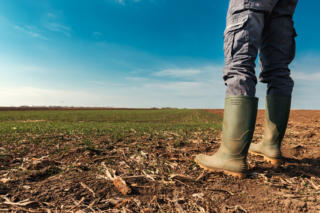The Westminster Food and Nutrition Forum
Posted on July 20, 2020 by Hannah Norman
On the 23 June, Hannah Norman, Policy Officer at the Microbiology Society, virtually attended the Westminster Food and Nutrition Forum. This event involved a discussion from policy makers and stakeholders on the future of UK agricultural policy. Here, Hannah discusses the experience.
I attended this meeting to give more context to our work highlighting the importance of microbiology to soil health as part of our ‘A Sustainable Future’ policy project. Soils have been highlighted as a vital component of sustainable food production in the United Nations Sustainable Development Goals (SDGs), the UK Government's 25 Year Environment Plan, and the new Agriculture Bill.
This meeting demonstrated that it is a very interesting time to be involved in work towards sustainable agriculture. Guy Horsington, from the Department for Environmental, Farming and Rural Affairs (Defra), explained the Future Farming and Countryside Programme. This programme is currently being developed to replace the Common Agricultural Policy, through which UK agriculture was subsidised and funded as an EU member. All speakers at the event talked about how this policy will allow ‘public money for public goods’; this involves paying farmers for the environmental services they deliver, including healthy soils, rather than the land they own.

It is clear that this is an extremely challenging time for British farmers, and this was highlighted by all of the speakers. Tom Hind from the Agriculture and Horticulture Development Board (AHDB) stressed that Covid-19, Brexit, new trade agreements and the climate crisis are all impacting the future of agriculture in the UK.
Soil was mentioned multiple times during the event; its importance for helping to achieve net zero carbon emissions in farming was highlighted by Sarah Mukherjee from IEMA, and Joanna Lewis from the Soil Association mentioned the importance of soil organic matter for baseline monitoring by land managers in recipient of the new Environmental Land Management Scheme. The case for more detailed soil characterisation and mapping was made very eloquently by Kim Graham from Shared Assets, as a way of identifying new areas of land which could be used for growing high value crops, particularly in peri-urban environments where it could help to reduce the inequality within our agricultural food system.
This was a very interesting event with a wide range of perspectives, and really enabled me to see the importance and scope of soil microbiology for the future of agriculture. Sustainability is clearly forefront in the minds of everyone in this area, but whilst several UK targets were mentioned, there was no mention of the SDGs during the event. In order to succeed in our targets for a sustainable future, the SDGs should be given more prominence in national and international sustainability discussions.

